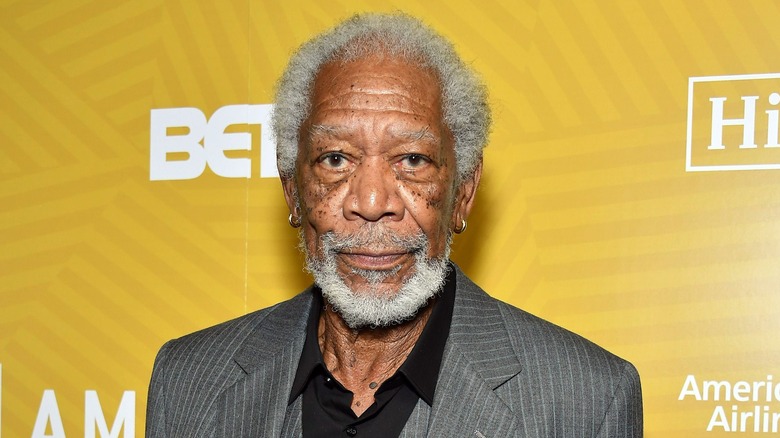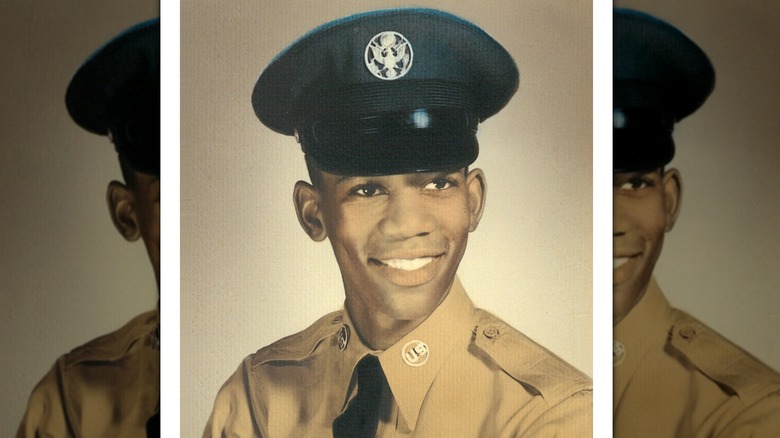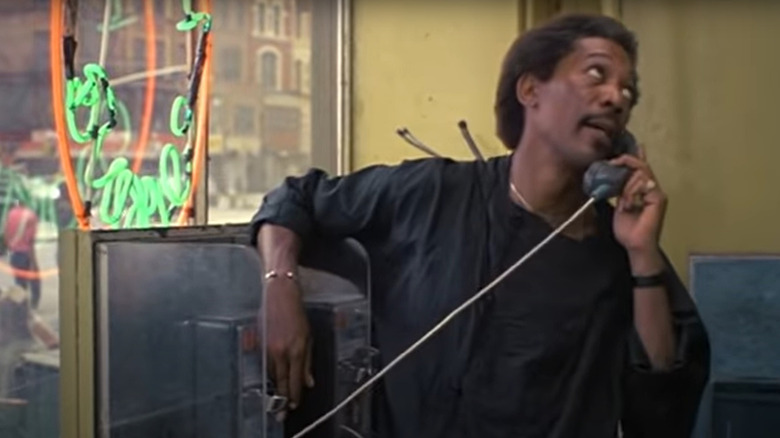The Sad Detail About Morgan Freeman Everyone Forgets
Anyone who's tried their hand at a new trade or occupation knows how disheartening failure can be, especially as one gets older. It's very easy for weeks to slip into months, and months into years, and before you know it half a life is gone while you weren't paying attention. Some people try to make it in a particular business for years before succeeding, especially in the arts. Others give up much more easily. But few would have the fortitude, perseverance, and patience to try and try for nearly 30 years with only minimal success to show for it. But then again, there's only one Morgan Freeman.
While it's easy to think of Freeman as a cultural mainstay and cinematic legend, it's much harder to think of him as someone who only got his big break at the mature age of 49. He graduated from high school in 1955, joined the Air Force for four years, left in 1959, and didn't get a breakout role all the way until 1987's "Street Smart." Along the way, as he said in an interview with The Guardian, he didn't do much except run into walls. And yet, perhaps because of his difficulties he retained a grounded, nonchalant attitude about those years, saying, "I'm an actor. Just waiting tables or pumping gas or delivering mail until my shot comes, y'know." Freeman is in his mid-80s at the time of writing, meaning those difficult years amounted to over one-third of his life.
Breaking the cycle of hardship
Some people might dismiss Morgan's Freeman's early career woes as less than tragic considering how they led to his current stardom. But considering Freeman's humble upbringing, it becomes clear that his difficult, pre-fame years were an easy time to give up. But rather than break him, that time shaped him into who he is.
Freeman didn't grow up in complete poverty, but he also didn't exactly have it easy. His father was a barber and his mother a teacher. The two moved to Chicago when Freeman was very young because of the pressures of the Jim Crow South in the 1930s and '40s, while Freeman stayed behind with his grandmother. When Freeman was 6 his grandmother died, and he moved to Chicago with his mother, who by then had separated from his father. Perhaps driven by a need to escape reality, Freeman grew up obsessed with movies.
All this is to say: Early, injurious childhood patterns can either repeat in adulthood and ruin a life, or be broken. It would have been the simplest thing in the world for Freeman to throw in the towel at any point from 1959, when he left the Air Force, all the way to 1987 when he got his role in "Street Smart." After all, if Freeman was doing the kind of odd jobs that he alluded to in his interview with The Guardian, he wasn't exactly living a lavish life. But persistence paid off, even amidst continued disappointments.
A mid-life career bloomer
Morgan Freeman's role in "Electric Company" wasn't huge, but it was a steady gig. Before that Freeman got a role in an all-Black Broadway version of "Hello, Dolly!" as well as other off-Broadway productions. He also got a few uncredited roles in the '60s, and finally a role on one episode of "Sesame Street" in 1974. This segued into "Electric Company," which was another kid's educational program. "Electric Company," however, got canceled in 1976 after five years and 780 episodes. Once again, Freeman — then in his late 30s — had to hit the job-hunting trail while waiting for an acting opportunity.
It took another 11 years for such a role to come up, in 1987. "Street Smart" wound up not only bringing Freeman to public attention but also granting him a host of awards nominations, including an Academy Award and Golden Globe. Two years later in 1989, he starred alongside Jessica Tandy in "Driving Miss Daisy." Not only were his acting chops indisputable at that point, but his future was secure.
As Freeman said in a later interview with NPR, he considered awards useful only inasmuch as they granted future work. In that regard, he considered a nomination more helpful than a win. Even when speaking of his voice-over work, and his "marketability" due to his unique voice, he simply said, "To me, it's just people talking." On the whole, interviews such as these demonstrate the psychological benefits of coming to success later in life, no matter the difficulties — Freeman remains as grounded and practical as ever, and unfazed by stardom and the lights of Hollywood.


